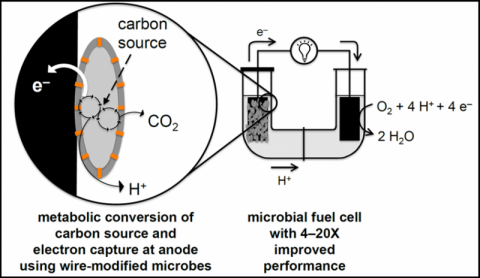Design of microorganisms with semiconducting membranes - Various documents on results from research grant
Bazan, G. (2013)

Published in: 2013
Publisher:
University of California Santa Barbara, USA
Author:
Bazan, G.
Uploaded by:
SuSanA secretariat
Partner profile:
common upload
5589 Views
0 Downloads
Content - Summary
This library entry contains background documents for a grant that Guillermo Bazan is leading and which is funded by the Bill and Melinda Gates Foundation.
Further information and a discussion is available on the SuSanA discussion forum, see link below.
Goal: The goal of this project is to introduce artificial molecular wires into the membranes of microbes within a waste treatment system as a way to break down organic contaminants in human waste and catalytically convert the metabolic energy in those microbes into electrical energy.
Short description of the project: Our idea is to use naturally occurring microorganisms in order to turn sanitary waste into electricity. The main innovation is the use of synthetic conducting molecular wires that self assemble within microbial membranes, thereby increasing electrical conductivity and enabling extraction of electricity from contaminants in sanitary wastewater. Creating a technology that utilizes these modified microorganisms in conjunction with bioelectrochemical devices offers an innovative solution for the design of decentralized sanitary wastewater treatment. Instead of using industrial additives, like chlorine or other disinfectants, our approach relies on the biodegradation of harmful contaminants by taking advantage of the metabolic activity in native microbial communities. Moreover, electricity or biofuel production may be harnessed from this process and be recycled back into the sanitary waste treatment process or be used directly on-site to serve the needs of the local community. Biggest successes so far and current state of affairs: We have demonstrated that microorganisms modified with transmembrane wires can enhance electricity production in microbial fuel cells by more than 400%. Microbial fuel cells incorporating modified Escherichia coli (a common species, which is part of the normal flora of the gut and is an indicator species for fecal bacteria) have been successfully employed. In addition, microbial fuel cells incorporating real wastewater as a source of both microorganisms and carbon source have also shown significant enhancement of electricity production with a concomitant decrease in the content of organic contaminants as a result of incorporating our synthetic wires. The results obtained with real wastewater are noteworthy as they show that the molecular wires may be added to ill-defined wastewater to elicit electrochemical activity from a native microbial population.
Using a metagenomic approach, we have recently obtained data that suggests that addition of synthetic wires to a mixed microbial community causes significant shifts in the makeup of the population. Some of the specific species within a mixed wastewater community wastewater that are most greatly affected by addition of our synthetic wires have also been identified. This information will be valuable as we strive for a more targeted approach to modifying microorganisms to further improve their efficiency when employed in bioelectrochemical devices to address the management of sanitary waste.
Start and end date: May 1, 2011 – May 1, 2013
Bibliographic information
Bazan, G. (2013). Design of microorganisms with semiconducting membranes - Various documents on results from research grant. University of California Santa Barbara, USA
Filter tags
East Asia & Pacific English Fundamental research and engineering North America















